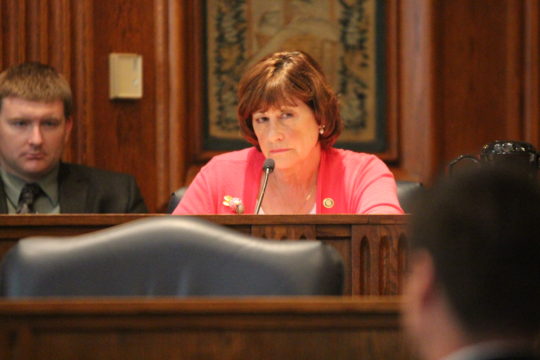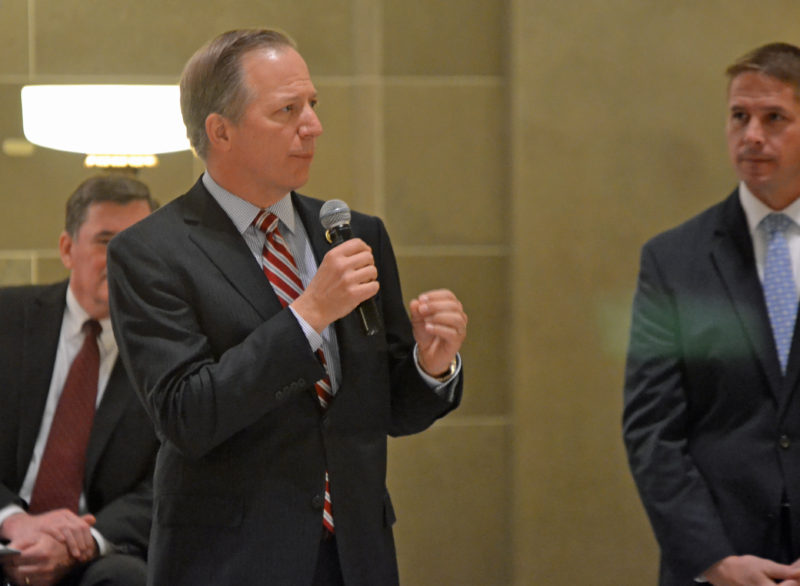JEFFERSON CITY, Mo. – The Senate Seniors, Families and Children Committee, chaired by Sen. David Sater, heard three bills regarding abortion regulations Tuesday in a long and occasionally heated and passionate five-hour marathon hearing.
The legislation offered by Sens. Bob Onder, Andrew Koenig, and Bob Dixon all presented legislation that responded to Gov. Eric Greitens’ call for a second special session last week. Koenig’s bill would give original jurisdiction to the attorney general’s office in cases involving violations of abortion laws, and Dixon’s bill would effectively void a St. Louis ordinance that adds womens’ reproductive decisions, ranging from pregnancy to abortion, to the city’s anti-discrimination ordinance.
However, Democratic Sens. Jill Schupp and Maria Chappelle-Nadal, who serve on the committee, made their opposition to the legislation well-known. Chappelle-Nadal repeatedly scolded witnesses who claimed to be pro-life while asking why they had not taken stances on the West Lake Landfill issue, which she has repeatedly called a “pro-life issue.” Schupp perhaps spoke more than any other person consistently interrogating bill sponsors and those who testified on both sides of the issue.
Onder’s bill dealt with the most wide-ranging rule changes and offered some of the most compelling testimony. The legislation, first and foremost, would define abortion clinics and re-add pieces of regulation pertaining to abortion clinics since a federal judge abortion clinics in Missouri cannot adhere to the regulations of ambulatory surgical centers.

Post-executive session, the bill would also provide whistleblower protections for those who work at abortion clinics, mandate that fetal tissue reports be examined more thoroughly by the Department of Health and Senior Services, and create new limits on which drugs can be offered for medical or chemical abortions.
Robin Utz was among those who testified in opposition to the bill. She spoke about her own abortion of a child who was diagnosed with a disorder that would stop the development of its lungs and kidneys and result in a painful and early death for the child.
The twist? She claimed Onder was her allergist.
“We terminated our daughter’s life out of love, and it was the most painful thing I’ve ever done in my life,” Utz said. “It makes me uncomfortable when we have what feels to me more like politically-led medical advice rather than science and fact-based, and that laws are being made on this. I shouldn’t have to leave the state I live in to receive the medical care I need.”
Utz said the repeated attempts by the General Assembly to infringe upon her right to an abortion had made her consider leaving the state.
Onder, however, argued that these new laws were well within the bounds of not impeding women from obtaining abortions while protecting the state’s interest in making sure they are carried out safely.
“A lot of discussion has been had today about whether this bill… represents an undue burden for women seeking abortion,” Onder said. “This is constitutional ground that has been thoroughly litigated over the decades… The common sense health and safety standards in SB 1 are well within those standards.”
As for Koenig’s bill, he noted his language would simply add another area of law to the list of narrow subjects in which the attorney general has original jurisdiction – including gaming violations, Medicaid fraud, and hazardous waste among other subjects. He added the law made sense because it could apply to women who obtain and doctors who perform abortions can cross county lines to do so.
“If you have a doctor that’s doing abortions in St. Louis and that same doctor doing it in Columbia, for instance, it’s not necessarily a problem, but it would make sense for someone that oversees the entire state to see if our laws are being violated,” Koenig said.
Jeffrey Mittman with the ACLU said the organization had concerns regarding the imposition of new laws based on little to no apparent need, which he said applied to Koenig’s bill.
“When the leg purports to act in defense of women’s health and safety, the court’s responsibility is to look at that supposition,” Mittman said. “With respect to original jurisdiction, there has been no evidence presented to us that there’s any need for a change in the jurisdictional handling on abortion manners.”
Sen. Bob Dixon’s bill would effectively make void a St. Louis ordinance that adds women’s reproductive choices to their anti-discrimination statute. He said it could force an alternative-to-abortion agency to hire those who do not receive pro-life views or force renters to rent to abortion agencies or providers against their morals.
Susan Klein, the legislative liaison of Missouri Right-to-Life, said she feared the law could force the religiously-minded to do something against their beliefs.
“This is just another venue of an intrusion on us as Christians to be forced to participate in something that we do not want to,” she said.
Dr. Colleen McNicholas, one of the state’s only abortion providers, testified on Dixon’s bill that some pregnancy resource centers, which typically seek to dissuade women from having abortions, this bill seeks to protect do not provide medically accurate information even if they purport to provide medical counsel. McNicholas, who operates out of the St. Louis Planned Parenthood, said she was required by law to meet specific standards of care as an abortion provider.
“We’re beholden to some minimal expectation of truthfulness,” she said. “We are mandated to provide language, there are words we have to use in those situations. We’re essentially allowing them to leave out entire therapies in these centers.”
When several senators said the pregnancy resource centers they had visited gave medically accurate information, McNicholas invited those same senators to also tour a Planned Parenthood.
During the executive session, Koenig and Dixon’s bills were included in Onder’s SB 1, which seems likely to become the primary vehicle for the extraordinary session. Onder’s bill was changed fairly significantly when Sen. David Sater removed anything that had not been vetted by the committee before. Onder said he may reintroduce those measures on the Senate floor, but he felt comfortable with the product.
“Despite the changes, I think we still have a bill that accomplishes the important goals of protecting pregnancy care centers and the work they do for women and helping to restore some common sense health and safety regulations that were struck down recently,” Onder said.
All three of the bills passed out of the committee along party lines, 4-2.










